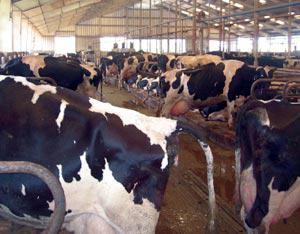Cornucopia Institute’s Complaints Expose Outlaw Factory Dairy Farms

Operators of factory-farm facilities claiming to be organic are feeling the heat from USDA enforcement actions. Responding to legal complaints filed by The Cornucopia Institute, USDA actions ranged from a slap on the wrist to decertification.
In California, the Case Vander Eyk, facility, with 10,000 cattle, had its organic dairy certification yanked earlier this year, stemming from a host of livestock management improprieties-primarily, confining their animals to a feedlot.
In late August, the Aurora Dairy, owner of five factory-farm dairies in Texas and Colorado and the supplier of private label milk to many of the nation’s biggest grocery chains (Wal-Mart, Target, Safeway, Costco, UNFI/Woodstock, and others), negotiated a plea agreement with USDA political appointees, allowing it to continue in operation in exchange for modifying livestock practices at its confinement facilities. The plea agreement followed findings by independent USDA investigators that the company had “willfully violated” 14 different organic regulatory standards.
In stark contrast to these enforcement actions, a USDA investigation into allegations of organic improprieties at two facilities owned by Horizon Organic has been closed. “We directly observed and documented many of the same activities that were found to be true with both Aurora and Vander Eyk,” said Mark Kastel, Cornucopia’s senior farm policy analyst. “USDA investigators never contacted us for our information or took sworn statements as in the other cases.”
The Vander Eyk organic suspension was a USDA secret until an industry source tipped Cornucopia. Cornucopia determined the accuracy of the story and publicly announced the enforcement action. But the reasons underlying the suspension were still not clear until Cornucopia obtained public documents related to the action from a Freedom of Information Act request.
Problems identified in the documents were:
- the lack of an audit trail tracking animals in Vander Eyk’s massive organic herd, which is fundamental to being able to prove that your cows actually qualify as organic-especially important as Vander Eyk milked both conventional and organic cows;
- lack of records indicating any pasturing of the herd;
- animal health records; and
- pasture management practice deficiencies.
Vander Eyk had been shipping “organic” milk to Dean/Horizon and Stremicks/Heritage Foods for years. Questions about Vander Eyk’s suspect management practices have been public knowledge in the dairy community since February 2005, when Cornucopia first filed its legal complaint, yet both of these dairy processors were willing to look the other way.
USDA’s investigation into Aurora’s organic practices began after Cornucopia filed complaints based on site visits to several of Aurora’s operations and interviews with numerous industry professionals familiar with Aurora’s practices. USDA’s investigative findings include:
- Aurora was confining thousands of animals in feedlots rather than pasturing its animals as federal regulations require.
- Aurora brought conventional replacement animals into its organic dairy herd-animals not qualified to produce organic milk and some from a heifer ranch that lacked organic certification.
- Aurora purchased suspect “organic” feed for its Texas operation from a friend of the dairy manager who had sprayed with herbicides.
- In its most serious violation, Aurora was selling, labeling, and representing milk for more than 3½ years as organically produced when it did not legally qualify-in “willful” violation of the law.
Yet this powerful $100 million company (backed with millions from Harvard University’s endowment fund) was able to negotiate a plea bargain in August, allowing it to stay in business. The deal, known as a “consent agreement,” was in the works for as long as 18 months and was the subject of considerable political wrangling while Aurora worked to lessen the sanctions.
The deal required Aurora to remove some animals from its dairy herd, downsize its Platteville, Colorado feedlot operation, provide regular access to pasture for its milking herd, and not renew organic certification for one facility. It is also under one year of increased scrutiny by USDA. But the agreement also allowed Aurora to keep thousands of illegal conventional animals it had incorporated into its herd.
“We think that, at a minimum, Aurora should have been slapped with a significant fine for deliberately abusing organic integrity and consumer trust and for flooding the market with bogus organic milk,” said Kastel. Federal organic regulations state that “any operation that knowingly sells or labels a product as organic, except in accordance with the Act, shall be subject to a civil penalty of not more than $10,000 per violation.”
During 2007 the growth in organic milk supply caused a surplus for the first time-largely due to factory farms like Aurora’s. The surplus is pushing down prices paid to legitimate ethical organic family farmers.
“Anyone found to be committing willful violations of the regulations, anyone, should not remain certified,” stated Jim Riddle, former chairman of the National Organic Standards Board and an internationally recognized expert on organic certification. Family-scale farmers from all over the country have questioned on internet forums whether, had they been found to be in violation, they would have been allowed one year of supervision instead of being fined and having their organic certification revoked.
Aurora CEO Marc Peperzak has his own response: “Aurora Organic Dairy has maintained continuous organic certifications for all of our farms and facilities. Our milk is and always has been organic.” Aurora representatives have indicated that the USDA-mandated changes will cost his company $3.3 million.
***
Will Fantle is the research director for The Cornucopia Institute (www.cornucopia.org).







